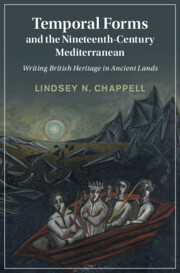Book contents
- Temporal Forms and the Nineteenth-Century Mediterranean
- Cambridge Studies in Nineteenth-Century Literature and Culture
- Temporal Forms and the Nineteenth-Century Mediterranean
- Copyright page
- Contents
- Figures
- Acknowledgments
- Introduction
- Part I “Civis Romanus Sum”
- Part II “We Are All Greeks”
- Part III “Kindred with the Mummy”
- Chapter 5 Ruin
- Chapter 6 Profanation
- Coda to Part III Unholy Land
- Conclusion
- Notes
- Bibliography
- Index
- Cambridge Studies in Nineteenth-Century Literature and Culture
Chapter 5 - Ruin
from Part III - “Kindred with the Mummy”
Published online by Cambridge University Press: 09 November 2024
- Temporal Forms and the Nineteenth-Century Mediterranean
- Cambridge Studies in Nineteenth-Century Literature and Culture
- Temporal Forms and the Nineteenth-Century Mediterranean
- Copyright page
- Contents
- Figures
- Acknowledgments
- Introduction
- Part I “Civis Romanus Sum”
- Part II “We Are All Greeks”
- Part III “Kindred with the Mummy”
- Chapter 5 Ruin
- Chapter 6 Profanation
- Coda to Part III Unholy Land
- Conclusion
- Notes
- Bibliography
- Index
- Cambridge Studies in Nineteenth-Century Literature and Culture
Summary
Chapter 5 explores how Harriet Martineau’s travel narrative Eastern Life, Present and Past and Dante Gabriel Rossetti’s poem “The Burden of Nineveh” organize time through ruins from the eastern Mediterranean. Eastern Life, which was criticized for its unorthodox historicization of Christianity, imagines how ruins themselves experience human empires across centuries. The temporal form of the ruin, Martineau shows, is a capacious present in which the revolutions of human religions and empires become insignificant. Rossetti’s poem, which focuses on ancient Assyrian relics arriving at the British Museum, similarly surrenders human duration to the ruin’s own temporality. For Rossetti, the museum’s attempts to redefine the ruin within its own linear historicism necessarily fail because the ruin has already proven its endurance through many changing imperial narratives. Both Rossetti’s and Martineau’s texts depict ruin as a temporal form that outlasts any empire’s claims to significance, challenging the centrality of human experience in time.
Keywords
- Type
- Chapter
- Information
- Temporal Forms and the Nineteenth-Century MediterraneanWriting British Heritage in Ancient Lands, pp. 169 - 195Publisher: Cambridge University PressPrint publication year: 2024

